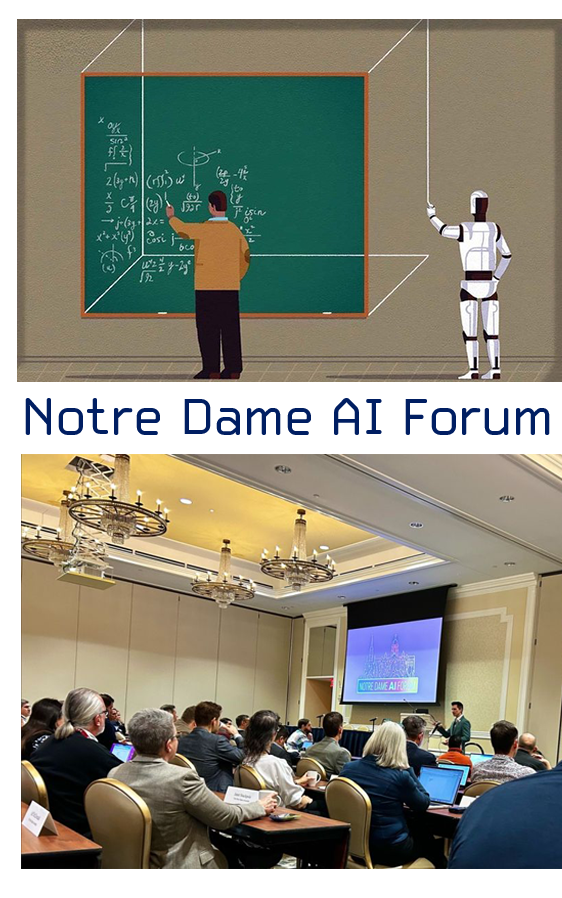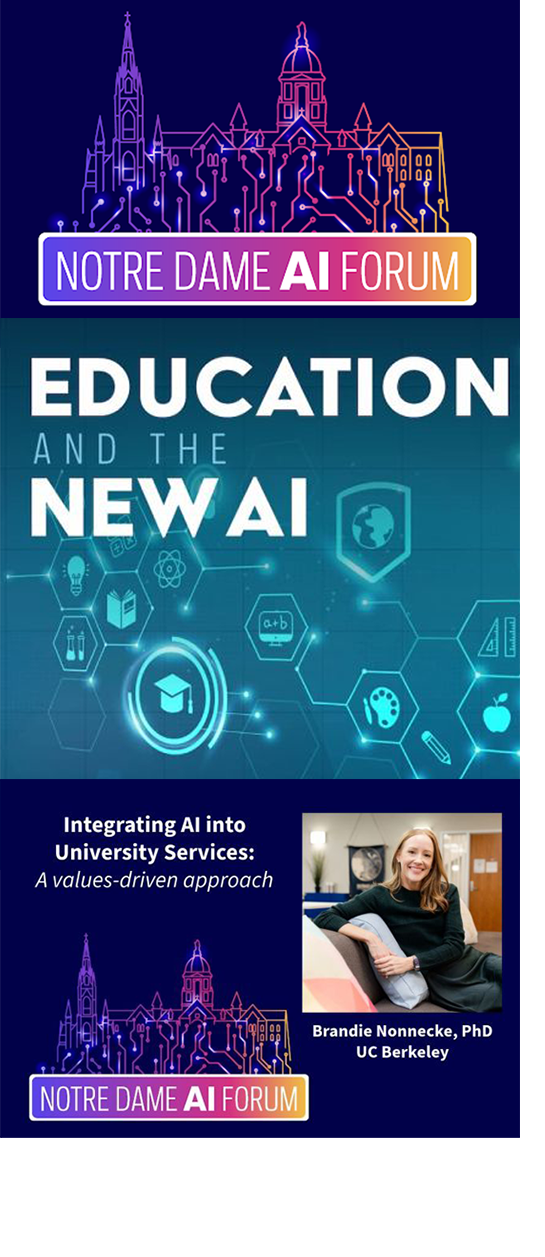AI Strategies and Considerations in Higher Education
text Heading link

Artificial Intelligence (AI) has been a large part of many conversations on campuses this year. As institutions strive to align institutional strategies, policies, and goals with AI strategies and implementations, it’s essential to consider key principles and factors to ensure responsible and effective execution. At the Notre Dame AI Forum in November 2023, representatives from different universities shared insights and experiences regarding integrating AI in academia, highlighting various approaches, challenges, and opportunities.
Defining AI in the Context of Human Objectives
Central to the discussion was the emphasis that AI primarily makes predictions and recommendations based on human objectives. This definition underscores the importance of ensuring that AI systems are aligned with institutional strategies and goals. As a group, it was concluded that whether driven by machine or human inputs, any AI application should be evaluated based on its appropriateness, transparency, accuracy, reliability, safety, fairness, non-discrimination, privacy, security, and adherence to human values.
Institutional Strategies and Goals Alignment
A crucial aspect discussed was aligning institutional strategies and goals with AI initiatives. The University of California Berkeley’s Responsible AI Working Group exemplified this approach by advocating for tailored AI solutions that meet specific institutional needs. Leveraging the multi-campus structure of universities was highlighted as a strategy for effective and equitable implementation while driving costs down.
Consideration of Established Policies
Ethical considerations, such as transparency, fairness, and privacy, were other important points of discussion. Institutions were encouraged to evaluate established policies and frameworks to ensure alignment with AI implementation. Initiatives like EDUCAUSE’s AI in Higher Education provided valuable guidelines for leveraging AI tools while upholding ethical standards and looking toward early adopters to learn from their successes and mistakes.
text 2 Heading link

Practical Applications and Case Studies
Several universities presented practical applications of AI in academia. For instance, the University of Michigan’s UM-GPT offers free access to AI tools for students, staff, and faculty, promoting equity and accessibility. Custom chatbots like Maizey provide tailored support, while the GPT Toolkit empowers educators to develop AI-assisted teaching tools.
Ethical Considerations and Best Practices
Ethics emerged as a recurring theme in AI integration discussions. The University of Delaware focuses on generative study tools that leverage lecture capture content and emphasize the importance of ethical considerations, including obtaining consent, mitigating bias, and prioritizing human well-being.
UIC AI Initiatives
Building on the momentum from the AI Forum at Notre Dame, the Technology Solutions team at UIC announced a lineup of AI tools designed to benefit the campus community. These tools include the Blackboard Ultra AI Design Assistant, Anthology’s Ally, Microsoft Copilot with Data Protection, Box AI, Grammarly, LinkedIn Learning Resources & AI-Powered Career Coach, Adobe Creative Cloud, and Zoom AI Companion. Many of these applications are out-of-the-box solutions that utilize AI, but as we look toward the next academic year, TS and LTS are interested in leading and developing a sandbox where new use cases can be further explored in AI.
While AI presents exciting possibilities, UIC emphasizes the importance of approaching these tools with caution and validation. The institution remains committed to providing all users with a safe and productive environment, encouraging feedback and collaboration. As AI continues to evolve, we look forward to partnering with the campus community to support their needs and foster innovation in higher education.
Conclusion
As AI evolves, universities must prioritize collaboration, ethical considerations, and continuous evaluation. While AI offers immense potential, it’s essential to approach its integration with caution and accountability. By aligning strategies with institutional goals and fostering collaboration, universities can harness the power of AI to create meaningful and equitable educational experiences for all.